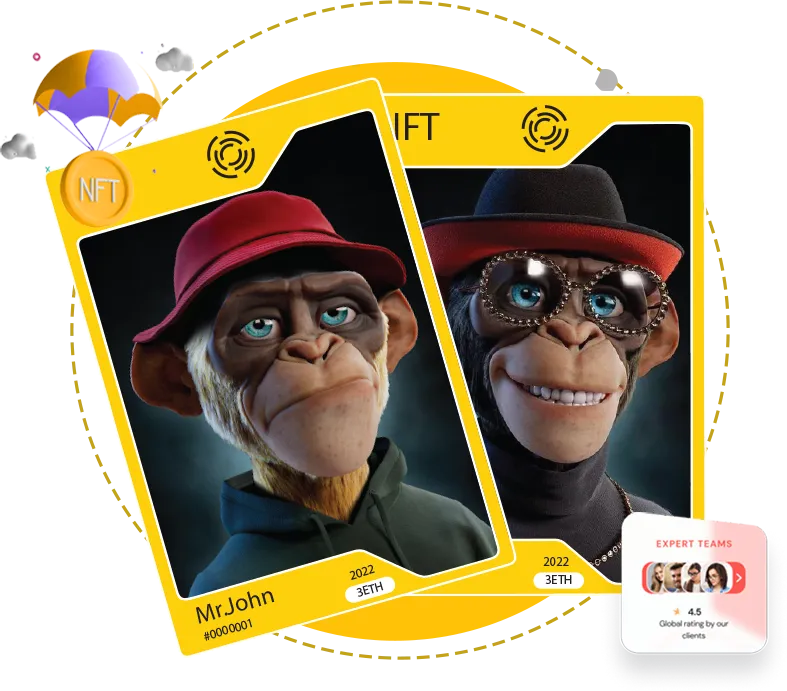Our Global Presence : ![]() India
India ![]() Dubai
Dubai
Be ready to create an NFT Marketplace platform with the help of ready-to-go software solutions.

| Components | Description |
|---|---|
| Smart Contracts code | Hand Coded Blockchain-based smart contracts for creating, buying, and selling NFTs. |
| Token Standards | Supports token standards like ERC-721 and ERC-1155 |
| Wallet Integration | Seamless integration with third party wallets |
| Decentralized Storage | IPFS integration to store NFT metadata and assets |
| Customizable UI/UX | Unique and branded user interface. |
| Trade and Bidding Engine | Robust engine for NFT trades, auctions, and bidding with order matching capabilities. |
| Gas Optimization | Gas-efficient transaction to minimize Ethereum network fees. |
| Cross-Chain Compatibility | Offers compatibility with multiple blockchains |
| KYC/AML Integration | In-built Know Your Customer (KYC) and Anti-Money Laundering (AML) compliance. |
| Analytics and Reporting | Detailed data analytics and reporting tools for users and administrators. |
| Scalability | Built to ensure smooth operation even during high transaction volumes. |
| API Integration | Seamless API integration with third-party services and applications, extending functionality and reach. |
| Governance Mechanisms | Governance systems programmed for community-driven decision-making on platform upgrades and changes. |
| Admin Dashboard | Comprehensive admin dashboard for monitoring, managing users. |
| Metadata Standardization | NFT metadata standards like JSON Schema, ensuring consistency and compatibility across assets. |
Support a wide range of NFTs, including digital art, collectibles, music, virtual real estate, and more. Examples include OpenSea and Rarible.
NFTs related to video games, allowing players to buy, sell, and trade in-game items and characters. Examples include Axie Infinity and CryptoKitties.
Designed for musicians and music enthusiasts, these platforms allow artists to tokenize their music, concert tickets, and merchandise. Audius and Zora are examples.
Dedicated to digital art and often feature exclusive art collections. SuperRare and KnownOrigin are notable examples.
These marketplaces deal with virtual land and assets within metaverse platforms. Decentraland and The Sandbox are prominent examples.
Focused on sports-related NFTs, these platforms offer collectible highlights, trading cards, and memorabilia. NBA Top Shot is a notable example.
These platforms are dedicated to fashion brands and luxury goods, offering NFTs for designer items and accessories.
These marketplaces are centered around collectible items, such as trading cards, vintage toys, and rare physical goods.
Some NFT platforms are driven by specific communities or social movements. These marketplaces often feature niche or thematic collections.
These marketplaces deal with blockchain domain names and their NFT representations. Examples include Unstoppable Domains.
| Technology / Language | Description |
|---|---|
| Ethereum, Binance Smart Chain, or other blockchain platforms. | |
| Solidity (for Ethereum) or similar languages. | |
| A JavaScript library for interacting with the Ethereum blockchain and other Web3-compatible networks. | |
| Used for decentralized and distributed storage | |
| ERC-721, ERC-1155, and ERC-20 | |
| Standards like JSON Schema or OpenSea's schema. | |
| MongoDB, PostgreSQL | |
| HTML, CSS, JavaScript, React, Vue.js, or Angular | |
| Node.js, Python, Ruby, or other server-side languages | |
| RESTful APIs and GraphQL for connecting to external services, blockchain data, and payment gateways. | |
| SSL/TLS for data encryption, security libraries | |
| SDKs for integrating with digital wallets like MetaMask and Trust Wallet to enable NFT transactions. | |
| Layer 2 solutions (e.g., Optimistic Rollups) and sharding | |
| WebSocket for enabling real-time notifications and updates within the marketplace. | |
| AWS, Azure, or Google Cloud. | |
| Git and platforms like GitHub for code versioning and collaboration. |
Developing a custom NFT marketplace from scratch can be expensive and time-consuming. Our solutions give an easy way for you to enter the market with a ready to deploy option, reducing development and infrastructure costs.
We designed this whitelabel NFT marketplace with a base set of features, they are often highly customizable. You can tailor the platform to match your branding, design preferences, and specific requirements.
Our White-label NFT marketplace is pre-built and comes with many features and functionalities already in place. This significantly reduces the time required to launch a marketplace, allowing you to enter the market quickly.
Our White-label NFT marketplace solutions are designed to scale as your user base and transaction volume grow. This scalability ensures that the platform can handle increased demand without major disruptions.
Our whitelabel NFT marketplace incorporates security features and compliance measures that adhere to industry standards and best practices, reducing the risk of vulnerabilities and regulatory issues.
Get to see the best user-friendly NFT Marketplace and features that enhance the user experience, making it easier for buyers, sellers, and creators to engage with the platform.
You can cross connect the NFT marketplace with various blockchain networks, digital wallets, and external services, streamlining the onboarding and transaction processes.
We offer technical support and updates, reducing the burden on your in-house development and IT teams. This ensures the platform remains secure and up to date.